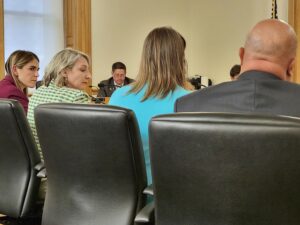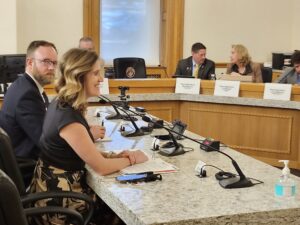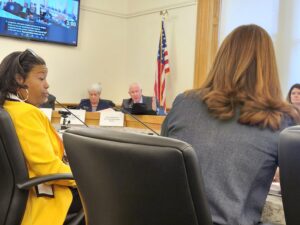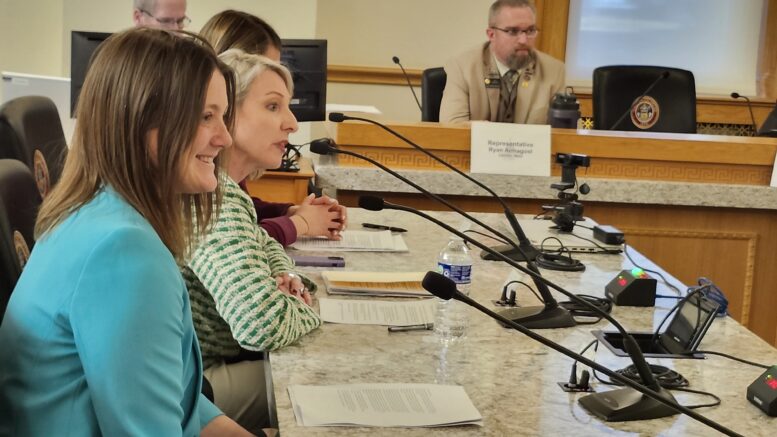Colorado legislators this week advanced two significant pieces of workforce-development legislation — one bill to create regional talent-development plans and grow an existing grant program, and another to create a system to track student success more closely.
Both House Bill 1364 and HB 1365 are key parts of a package announced two weeks ago by Gov. Jared Polis to get students and upskilling workers equipped with skills that employers need, particularly in evolving or highly in-demand sectors. They also address the two top recommendations offered last fall in a report from the Education to Employment Alliance, a coalition of five business-focused groups seeking to boost talent pipelines in sectors that too often deal with shortages of career-ready workers.
HB 1365, sponsored by Democratic Rep. Meghan Lukens of Steamboat Springs and Republican Rep. Matt Soper of Delta, would add $3.8 million to the Opportunity Now program that offers grants to public-private partnerships proposing new training programs. It also would establish a series of seven regional talent-development summits that would bring together business and education leaders to plot two- and five-year plans in which they collaborate to boost career pipelines in good-paying industries that are lacking.
Meanwhile, HB 1364 would create a longitudinal data system tracking the career trajectory of students who enroll in programs from early childhood education to various college majors, to understand which career-preparatory courses work best. It also would fund a study to understand the cost and effectiveness of a variety of worker-training programs and create an independent office to work with numerous state departments to collect data and make it usable to the broader public.
The need for improved workforce development
The two bills come at a time when there are roughly 1.8 job openings for every unemployed state resident, but too many non-working Coloradans can’t find jobs because they lack the skills needed by employers trying to expand. They also come as the portion of Colorado high-school graduates seeking a post-diploma degree or certification has slipped below 50%, even as the Colorado Talent Pipeline Report estimates 91.4% of jobs that pay family-sustaining wages require advanced certification.

Colorado state Rep. Mike Lynch listens to testimony on House Bill 1365 from Colorado Office of Economic Development and International Trade Executive Director Eve Lieberman, Colorado Chamber of Commerce President/CEO Loren Furman, Colorado Succeeds Vice President of Policy Katie Zaback and Greater Pueblo Chamber of Commerce President/CEO Duane Nava.
Duane Nava — president/CEO of The Greater Pueblo Chamber of Commerce — said that open communication is needed between business and education leaders to get students the skills they need to have fulfilling and good-paying careers. Bringing both groups to the same table can break down walls that may now exist between them, and it can create relationships that extend well beyond the two- and five-year plans created through HB 1365 and build long-lasting, seamless workforce-development relationships, he said.
“It is vital that local business and economic-development organizations be able to work with local educational organizations to ensure that students are prepared with the skills they need,” Nava told the House Business Affairs & Labor Committee. “Getting business and education leaders together can help to break down those silos that now exist. This would allow for a more forward-looking approach, instead of one that’s reactive.”
Regional talent-development planning
HB 1365 would fund seven regional talent-development summits across the state as well as a coordinator that would create the short- and long-term plans based on the summits, which the Colorado Workforce Development Council would help to move forward. By holding the summits in various regions, participants could create talent pipelines in specific industries that local leaders are trying to grow, whether that be advanced manufacturing or health care or technology.
The bill also includes $3.8 million more for a fourth, infrastructure-focused round of funding for the Opportunity Now grant program, which seeks combined proposals from business, education and government organizations to train or upskill workers. Polis announced the second round of grants from the program on Wednesday — money that will go industries from construction to health care to software development and will fund training for roughly 6,500 individuals statewide.

Colorado state Reps. Matt Super and Meghan Lukens explain their House Bill 1365 to a committee on Wednesday.
And the proposal includes $15 million in tax credits that will help training programs grow capacity and serve more student or adult learners. Loren Furman, president/CEO of the Colorado Chamber of Commerce, noted that 51% of respondents in chamber surveys in 2022 and 2023 identified finding and retaining workers as one of their top three challenges.
“There is still a disconnect between what employers need and the credentials that are available to students,” Furman told the House business committee before it advanced HB 1365 by an 11-0 vote to the House Finance Committee. “This next step gets students into the talent-development pipeline to ensure they can find careers.”
Longitudinal data system
HB 1364 doesn’t create new programs so much as it tries to take data that is being generated from a host of current education and workforce-development efforts and make it usable by students considering career pathways and policy makers that fund them. It identifies state agencies dealing with education and with labor and calls for them to compile and collate data in ways that can determine the career success of students from early-childhood-education years all the way through college, McCluskie said.
Not only are fewer students choosing to seek advanced credentials these days, but surveys in recent years have found more Americans losing faith in the benefits that a higher-education degree can bring. HB 1364 could provide what Amadou Dieng, policy and advocacy manager for Colorado Succeeds, called a “one-stop shop” where students and families learn about the earnings potential of educational pathways and use that to make informed choices.

Colorado state Rep. Anthony Hartsook asks a question Thursday to sponsors of House Bill 1364.
As envisioned, the new longitudinal data system could follow a student through concurrent enrollment and career-and-technical-education classes to determine if they helped that learners go into a related field and find steady employment, said Sarah Heath, CTE director for the Colorado Community College System.
“We’re looking forward to being able to track learners in particular into the workforce because we know they’re working, but we don’t know where they are,” Heath told the House Education Committee during a hearing Thursday.
The committee moved HB 1364 unanimously onto the House Appropriations Committee, which is likely to consider it after the Joint Budget Committee finishes putting together the proposed state budget for the next fiscal year in the next week or so.
